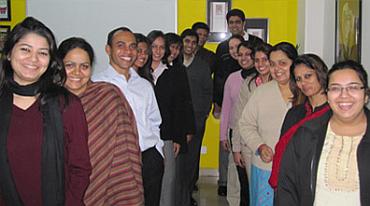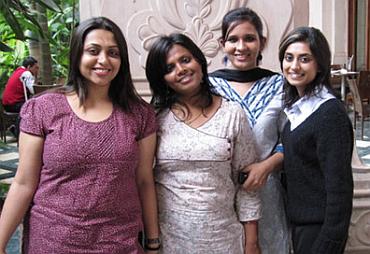
Nandita Lakshmanan, the feisty founder and CEO of public relations company, The PRactice, should know why it is a myth.
Nandita, who started a public relations company The PRactice in the year 2000 with just Rs 35,000 -- with which she bought a computer -- and three employees, has made it into a "mid-sized company with a substantial turnover" with 85 employees in a decade since then. And she did it without any venture capital funding or any angel investor handholding the company or providing loads of cash to bankroll her expansion plans.
It is not that venture capitalists and angel investors did not approach The PRactice as the company ramped up its operations and showed signs of success. Nandita politely turned all of them away.
Today her company is planning to diversify into healthcare, education and consumer segments (The PRactice started as a technology public relations company) and she plans to invest some "serious money" in scaling up the operations. Interestingly, she is confident of doing it from internal accruals without having to depend upon investors. For the record, The Practice is, till today, a zero debt company.
So, what's the success mantra that has made a start-up complete ten successful years of its existence without any venture capital funding or handholding?
"The middle class values instilled in me teach me that it is important to live within your means. The entire business at The PRactice has been built without any loans from anybody. Whatever we had we started our business with that and whatever we earn we put it back into the company to achieve scale," says Nandita proudly.
With a Masters in English literature from Delhi University she began her career in 1993 after completing a diploma in public relations. After working for Genesis for 7 years the entrepreneurial bug finally bit Nandita in 2000 and ever since she is devising strategies to take The PRactice places.
In a telephonic interview with Prasanna D Zore on the eve of Women's Day on March 8 Nandita discussed her success mantras, lessons she learnt in her 17-year career and the values that guide her company.
Click NEXT to read how Nandita nurtured her start-up company even as the dot com bubble burst all around her.

You started The PRractice at a time in 2000 when start-ups in the servicing sector were not too fashionable...
Call it intuition or my exposure in the field of public relations helped me look differently at every aspect of this business. And I have had the privilege to work with some very large corporates in my earlier tenure with previous firms. I was not convinced about any of the dot com ventures that I came across because in my belief an idea is an idea, a strategy is a strategy till such time it is successfully implemented.
I feel your ability to execute and take an idea to its natural conclusion is very important. That's what really determines the success of that idea.
When I started The PRactice I was very clear that I was not in it just for the opportunity. I believed there was a real need to take public relations industry to the next level; to take it beyond what is normally understood by a lot of people who think public relations is limited to press relations or media relations. Having studied PR and having worked with some of the best PR companies in India I was sure that this dilution will surely hamper the growth of the PR industry in the long run.
You worked with a lot of start-ups as your clients. Can you tell us how insecure does one feel working for a start-up?
We were a start-up when we started working with a lot of start-ups. There was empathy for start-ups in the beginning. One of the great things about start-ups is the amount of leeway that you get to be very, very creative but you come up with best workable ideas. There's no room for trial-and-error which some of the large corporates allow you to do.
With start-ups you just have to be very, very focused on what will work for them and go for that.
So how then did The PRactice sustain its business in an era when dot coms were the in thing?
We did a few things right from the very beginning. One, we started this as a firm focusing on product start-ups. We seriously didn't believe in the dot com businesses as they were surviving only because of the large dollops of venture capital money chasing ideas. But these dot coms had no thought on how to create sustainable businesses.
Therefore as a start-up it was very important for us to take clients who would have that long-term vision. Because we would grow with them. The option was to do that or to look at technology that would be mainstream. We worked with this very exciting tech product start-up company called UniMobile (earlier Gray Cell) in the wireless space and look at where wireless, as a sector, is today.
And in our first year, in a nation-wide pitch, we won Infosys as our client. That was a huge boost to our morale because we were only a three-people company then.
So, in hindsight, did the strategy of not going after dot com clients help?
The dot com bust did not affect us because we did not have a single dot com company as our client. Had I been opportunistic I would have had more than 15 clients from the sector and would have gone down under after the bubble burst in 2001. In hindsight, it was a good decision to keep off dot com companies.
Click NEXT to read lessons Nandita learnt in her 17-year career.

What about the competition?
When Practice started most of our competitors were a decade old. They had a huge head start and there was no way we could have competed with them. We would focus on retention of client as a philosophy. Which means we had to convert all our relationships into deep-rooted partnerships and the amount of time we would invest in a client will be at a much higher level.
What is your expansion plans a decade after The PRactice's birth?
We are an 85-member team today with three offices (in Mumbai, Bangalore and Delhi) and a fledgling office in Hyderabad.
We have recently regrouped ourselves in verticals and from being a pure technology PR firm today we have diversified into healthcare, consumer and education sector.
What useful lessons did you learn along the way in your 17-year career till now?
One, there are no shortcuts in the business of corporate communication.
Second, as I always say, it is always better to grow slow but to grow right. And that's something we practice very strictly at The PRactice. We are today living in a time where everybody wants to go for the 100-metre sprint. I strongly belong to the old school of thought, and believe, like Infosys' N R Narayana Murthy, that it's a marathon. If you really want to become a change agent then the 100-metre dash will take you nowhere.
Third the middle class values instilled in me teach me that it's important to live within your means. The entire business at The PRactice has been built without any loans from anybody. Whatever we had we started our business with that and whatever we earn we put it back into the company to achieve scale.
Click NEXT to read Nandita's success mantras.

So The PRactice is a self-funded company? No venture capital investors?
There is a myth that start-ups needs investors and venture capital funding. If you have fundamentals in place you can do it on your own.
I had only Rs 35,000 that I invested in a computer to start the company. Today, we are a mid-sized company, with a substantial turnover. I think we have a long way to go but we are at a very exciting stage. The company is brimming with confidence. We have just identified new verticals, which require serious amounts of investments, and we are ready for that.
And we have absolutely no plans to go public.
Guiding principles at The PRactice...
First and foremost is integrity it tops the chart. Especially in public relations which deals with facts and figures, integrity is a critical virtue. The other principle is the passion and the energy that one derives from the passion of whatever you do.
Were there naysayers who discouraged you, you being a woman entrepreneur?
I think I've been privileged to come from a very liberal family that believes in giving equal opportunity to everyone. We were never been made aware of the gender differences. We were free to make our choices in life. The only condition being that we will be held accountable for that choice. And I think that comes with a huge responsibility and I do attribute a lot of what I have done and achieved so far to that very important gift that my parents gave me: The ability to make a choice -- right or wrong -- and be accountable for that choice.
Success mantras or tips for young entrepreneurs...
Make sure that your idea and strategy can be implemented. Make sure you focus as much on the implementation as the strategy to convert your idea into an enduring business.
Drive your business at your own speed. There will always be hundred-fold opportunities around you. But if you try to reach out to all these opportunities and short charge your focus and drive then you would take much longer to reach your goal than if you really focus on where you want to go and be clear about your vision.
Stay on track and when the time is opportune you will know when to reach out to that opportunity. Don't get enticed by the hundred-fold opportunities that tempt you to digress from your chosen path.